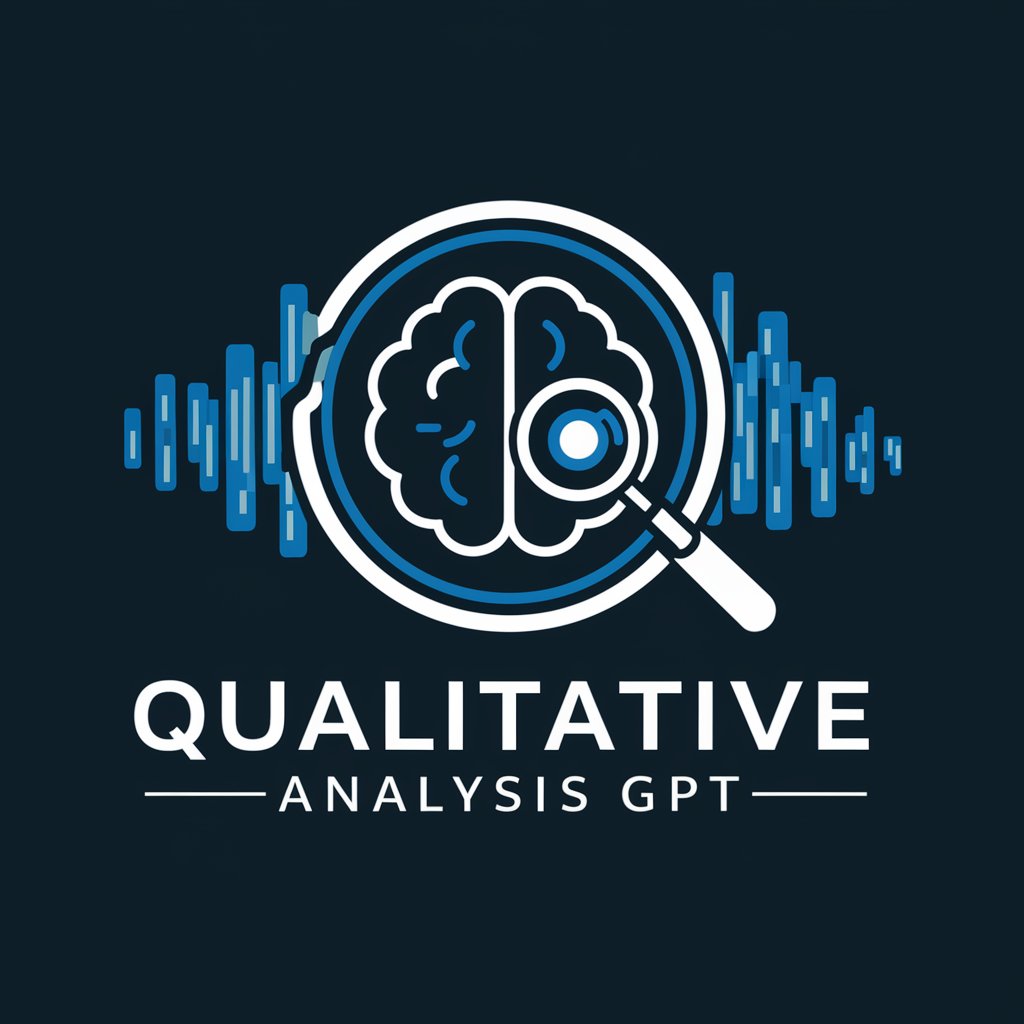Qualitative Analysis - Qualitative Data Interpretation

Hello, let's dive into qualitative insights together.
Uncover deeper insights with AI-powered analysis.
Explore the deeper implications of...
Analyze the qualitative aspects of...
Interpret the underlying themes in...
Examine the non-numerical data to reveal...
Get Embed Code
Understanding Qualitative Analysis
Qualitative Analysis focuses on the examination and interpretation of non-numerical data to uncover patterns, themes, and meanings. Unlike its quantitative counterpart, which seeks to quantify data and apply statistical models, qualitative analysis delves into the depth, richness, and complexity of data. This approach is pivotal in understanding social phenomena, individual experiences, and complex interactions within specific contexts. For example, in exploring the impact of remote work on employee well-being, qualitative analysis might involve detailed interviews with employees, thematic analysis of diary entries, or observation of virtual team meetings. These methods allow for a nuanced understanding of the personal and collective experiences of remote work, beyond what numerical data can provide. Powered by ChatGPT-4o。

Core Functions of Qualitative Analysis
Thematic Analysis
Example
Identifying common themes in patient narratives to improve healthcare delivery.
Scenario
In a study aimed at enhancing patient-centered care, researchers conduct interviews with patients about their hospital experiences. Through thematic analysis, they identify recurring themes such as the need for empathy from healthcare providers and efficient communication. These insights inform policy changes and training programs to address patient concerns.
Content Analysis
Example
Analyzing social media content to gauge public opinion on climate change.
Scenario
A non-profit organization dedicated to environmental advocacy uses content analysis to examine discussions on social media platforms regarding climate change. By categorizing comments, posts, and hashtags, they identify key concerns, misconceptions, and the overall sentiment of the public. This information guides their communication strategies and outreach efforts.
Ethnography
Example
Studying workplace culture in a multinational corporation.
Scenario
An organizational psychologist spends months observing and interacting with employees across different departments of a multinational corporation. Through ethnographic study, they uncover how cultural differences influence teamwork and communication patterns. These insights help in designing interventions to foster a more inclusive and collaborative work environment.
Case Study Research
Example
Exploring the success factors of a viral marketing campaign.
Scenario
A marketing analyst conducts a case study on a highly successful viral marketing campaign by a startup. Through in-depth interviews with the campaign creators and analysis of social media engagement data, they identify key strategies that contributed to its success. The findings are used to guide future marketing initiatives.
Who Benefits from Qualitative Analysis?
Researchers in Social Sciences
Social scientists studying phenomena like cultural trends, social behaviors, and individual experiences rely on qualitative analysis to uncover the underlying meanings and patterns in their data. This approach allows them to generate rich, contextual insights that are crucial for understanding complex social dynamics.
Market Researchers
Market researchers use qualitative analysis to understand consumer preferences, brand perceptions, and purchasing behaviors. Through methods like focus groups and in-depth interviews, they gather nuanced consumer insights that inform product development, branding, and marketing strategies.
Policy Makers and Public Administrators
For policy makers and public administrators, qualitative analysis is essential in crafting policies that reflect the needs and realities of the population. Engaging with community narratives, stakeholder interviews, and policy impact stories helps in creating more effective and inclusive public policies.
Healthcare Professionals
Healthcare professionals and medical researchers benefit from qualitative analysis by understanding patient experiences, treatment outcomes, and the social determinants of health. This approach can lead to more empathetic care practices and patient-centered health interventions.

Guidelines for Using Qualitative Analysis
Start Your Journey
Begin your exploration by accessing a free trial at yeschat.ai, where you can experience Qualitative Analysis without the need for signing up or subscribing to ChatGPT Plus.
Identify Your Data Source
Gather the qualitative data you wish to analyze. This could be text from interviews, focus groups, observations, or documents. Ensure the data is relevant to your research question or objective.
Choose Your Analysis Approach
Select an appropriate method for analyzing your data, such as thematic analysis, content analysis, or discourse analysis. This choice should align with your research goals and the nature of your data.
Analyze Your Data
Begin the analysis by reading through your data multiple times to familiarize yourself with it. Then, code the data by identifying patterns, themes, or categories that emerge.
Refine and Interpret
Refine your themes or categories as needed. Interpret the findings in the context of your research question, the existing literature, and the theoretical framework you are working within.
Try other advanced and practical GPTs
Office Management
Streamline Your Office with AI

Carlinesque⚡️
Revolutionizing humor with AI power

日本の名湯・秘湯ナビ
Discover Japan's Best Hot Springs with AI

Laravel Sage
Elevate Your Laravel Projects with AI

Peanut
Unlock the Power of Nuts with AI

Outrank the Competition
Elevate Your Content with AI

Epic Bard
Crafting Engaging Narratives with AI

Secretaria de Saúde de São Sebastião
Empowering health with AI-driven assistance.

PokéQuery Expert
Unleash Pokémon Magic with AI

Salva Nós
Empowering Students with AI

AdSignals Visualizer - Your Creative Ads Assistant
Revolutionizing Visual Ad Creation with AI

Coach Matchmaker
Empowering leadership with AI-matched coaching

Frequently Asked Questions About Qualitative Analysis
What is Qualitative Analysis?
Qualitative Analysis involves examining non-numerical data to uncover patterns, themes, and meanings. It's used across various fields to gain deeper insights into human behavior, social phenomena, and cultural practices.
Can Qualitative Analysis be used in business settings?
Absolutely. Businesses use Qualitative Analysis to understand customer feedback, brand perception, and market trends. It helps in crafting strategies that are deeply informed by customer experiences and preferences.
How does Qualitative Analysis differ from Quantitative Analysis?
Qualitative Analysis focuses on understanding the quality or nature of phenomena, often through thematic or content analysis, while Quantitative Analysis quantifies data and often uses statistical methods to test hypotheses.
What are some common tools used in Qualitative Analysis?
Common tools include software for coding and text analysis, such as NVivo or ATLAS.ti, which help in organizing, coding, and identifying patterns in qualitative data.
How can I ensure the validity of my Qualitative Analysis?
Ensuring validity involves techniques like triangulation, member checking, and maintaining a reflexive journal. These methods help in verifying the findings and ensuring they accurately represent the data.
